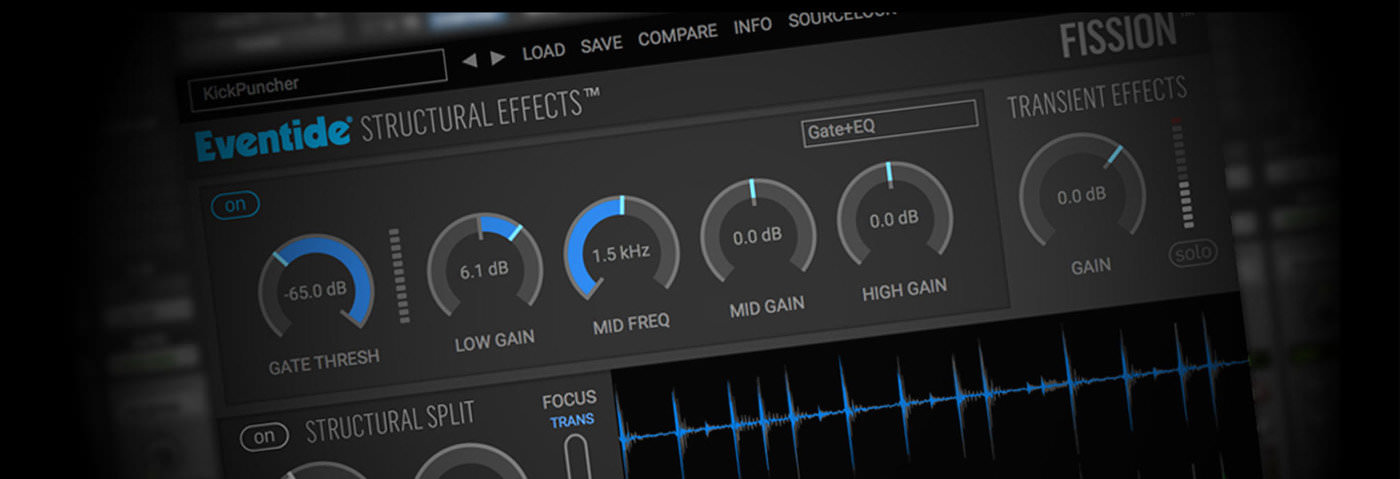Eventide’s newest effect is based around unique signal processing technology. Greg Scarth finds out why it really does bring something new to the table.
Like the story of the boy who cried wolf, the words of software reviewers have been rendered almost impotent by years of breathless hyperbole. When you’ve awarded full marks to every new Minimoog emulation and declared every tiresome rehash of the same processing techniques to be a game changer, where do you have left to go? The problem is that when something genuinely innovative comes along, it’s easy for it to slip through the net along with all the cookie-cutter plugins that hit the market every week.
Eventide have the pedigree to ensure that their products usually get the attention they deserve, but more importantly they also back up their claims with rock solid theory. Fission is the first implementation of the New Jersey company’s new Structural Effects technology, which they’re in the process of patenting. That’s usually a good sign that something is somehow innovative.
Fission is the first implementation of the New Jersey company’s new Structural Effects technology, which they’re in the process of patenting.
In essence, the Structural Effects technology makes it possible to separate the transients of a signal from the tonal elements, allowing each to be processed independently. The science behind the process is complex, but the implementation is relatively straightforward in practice.
In Fission, the emphasis is on applying quite traditional effects to each part of the signal. These specific options are different for the transient and tonal sections – with each set tuned to match the most probable characteristics of the sound – but they’re all quite standard stuff: things like delay, compression, phaser and reverb for the transients; chorus, tremolo and EQ for the tonal elements.
The easiest way to get to grips with the concept is to load up the plugin on an audio channel and use the controls to hear each part of the sound in isolation. What’s impressive is that there are no noticeable artefacts to the sound, either when auditioning the transient and tonality individually or when listening to the two signals mixed back together.
Kaitlyn Aurelia Smith's 'Water Percussion' preset applies a phaser to the transients and tremolo to the tonal elements.
Fission is a relatively simple implementation of Structural Effects, especially considering the potential power of this approach. It seems Eventide have deliberately kept things basic as they introduce the concept to people, but that doesn’t mean it’s not effective. There are presets aimed at relatively everyday mix techniques such as the ‘Vocal Calming’ preset, which compresses the transients and EQs the tonal elements. Others are much more creative, with a focus on complex sound design, such as Kaitlyn Aurelia Smith’s ‘Water Percussion’ preset, which applies a phaser to the transients and tremolo to the tonal elements. What excites me most, however, is the potential to use two instances of Fission to split the signal up and process it with third-party effects. Imagine, for instance, sending the transient alone to an 1176 emulation to colour it, while feeding the tonality into your favourite reverb to create unique ambient effects.
Structural Effects offer a unique new level of precision which is hard to compare to anything else that already exists on the market. Fission reminds me in a strange way of the pitch correction software Melodyne. When Celemony showcased their new Direct Note Access (DNA) features at Musikmesse 2008, it was a truly groundbreaking step in signal processing. Developers had already claimed to offer similar features, but in reality Melodyne DNA was truly innovative.
There are effects which claim to do vaguely similar things to Fission, but in practice it’s light years ahead of anything I’ve heard. Allow a reviewer some hyperbole this one time: Structural Effects are a genuine game changer. I’m intrigued to see how future implementations of the technology will build on that gigantic potential.
Fission, $179 – eventide.com
